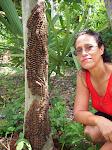Tuesday, March 10, 2015
Too Much Praise Can Turn Kids Into Narcissists, Study Suggests
Helicopter parenting, along with other forms of over-parenting, have come under considerable criticism in recent years for creating a generation of kids who can’t problem-solve for themselves. Now, a related parenting behavior – “overvaluing” one’s kids – has come under similar fire: But here, for creating narcissists-in-the-making. A new study from The Ohio State University suggests that constant – and perhaps undue – praise for our kids’ tiniest accomplishments, or non-accomplishments, may have the unintended side-effect of creating an over-inflated ego. And this can have serious consequences both in childhood and later on in life.
“Research shows that narcissism is higher in Western than non-Western countries, and suggests that narcissism levels have been steadily increasing among Western youth over the past few decades,” the authors write in Proceedings of the National Academy of Sciences.
The team examined the roots of narcissism, by pitting two competing theories of narcissism against each other. The social learning theory suggests that kids become narcissists when their parents overvalue them – that is, when parents treat their kids as fundamentally more deserving than others, or as Freud put it, when they “are under a compulsion to ascribe every perfection to the child—which sober observation would find no occasion to do.” In contrast, a psychoanalytic theory suggests that kids become narcissists when their parents withhold warmth – so the kids have to put themselves on a pedestal and seek approval elsewhere. To test which of these theories is more on-point, the team had kids in the Netherlands, ages 7-11, and their parents fill out questionnaires every six months for a year and a half.
Some of the questions probed narcissism in the children: For example, the kids had to rate how much they agreed with statements like, “Kids like me deserve something extra.” Some statements probed self-esteem: “Kids like me are happy with themselves as a person.” Parents also had to rate statements about the “value” of their kids: “My child is a great example for other children to follow,” for instance. Finally, both parents and kids answered questions about how much warmth parents showed their kids: “I let my child know I love him/her” (or, for kids, “My father/mother lets me know he/she loves me”).
Which kids were more likely to be narcissistic as time went by? Parental overvaluation was the largest predictor of a child’s narcissism over time, but interestingly, it did not predict self-esteem. In other words, telling kids how exceptional they are doesn’t produce kids with good healthy self-esteem – it just makes them more narcissistic.
“People with high self-esteem think they’re as good as others, whereas narcissists think they’re better than others,” said co-author of the study Brad Bushman. “Children believe it when their parents tell them that they are more special than others. That may not be good for them or for society.”
Beyond being annoying to friends and colleagues, narcissism is a trait that comes with a number of psychological and social problems, both in childhood and in adulthood, some of which can be serious.
“Narcissistic children feel superior to others, believe they are entitled to privileges, and crave for constant admiration from others,” study author Eddie Brummelman tells me. “When they fail to obtain the admiration they want, they may lash out aggressively. Narcissistic individuals are also at increased risk to develop addiction. Subgroups of narcissists, especially those with low self-esteem, are at increased risk to develop anxiety and depression.”
Of course, narcissism is partly based on genetics, so some of its development may be beyond our control. “Research suggests that, indeed, the role of genes and the environment are evenly split,” says Brummelman. And that’s both bad and good news. If your child is genetically predisposed to narcissism, it’s all the more important not to falsely inflate his or her sense of worth, but instead to be more down-to-earth about congratulations, and more reserved about praise.
Bushman, who has three kids himself, says that his research in narcissism “has changed my parenting style…. When I first started doing this research in the 1990s, I used to think my children should be treated like they were extra-special. I’m careful not to do that now.”
Subscribe to:
Post Comments (Atom)










No comments:
Post a Comment